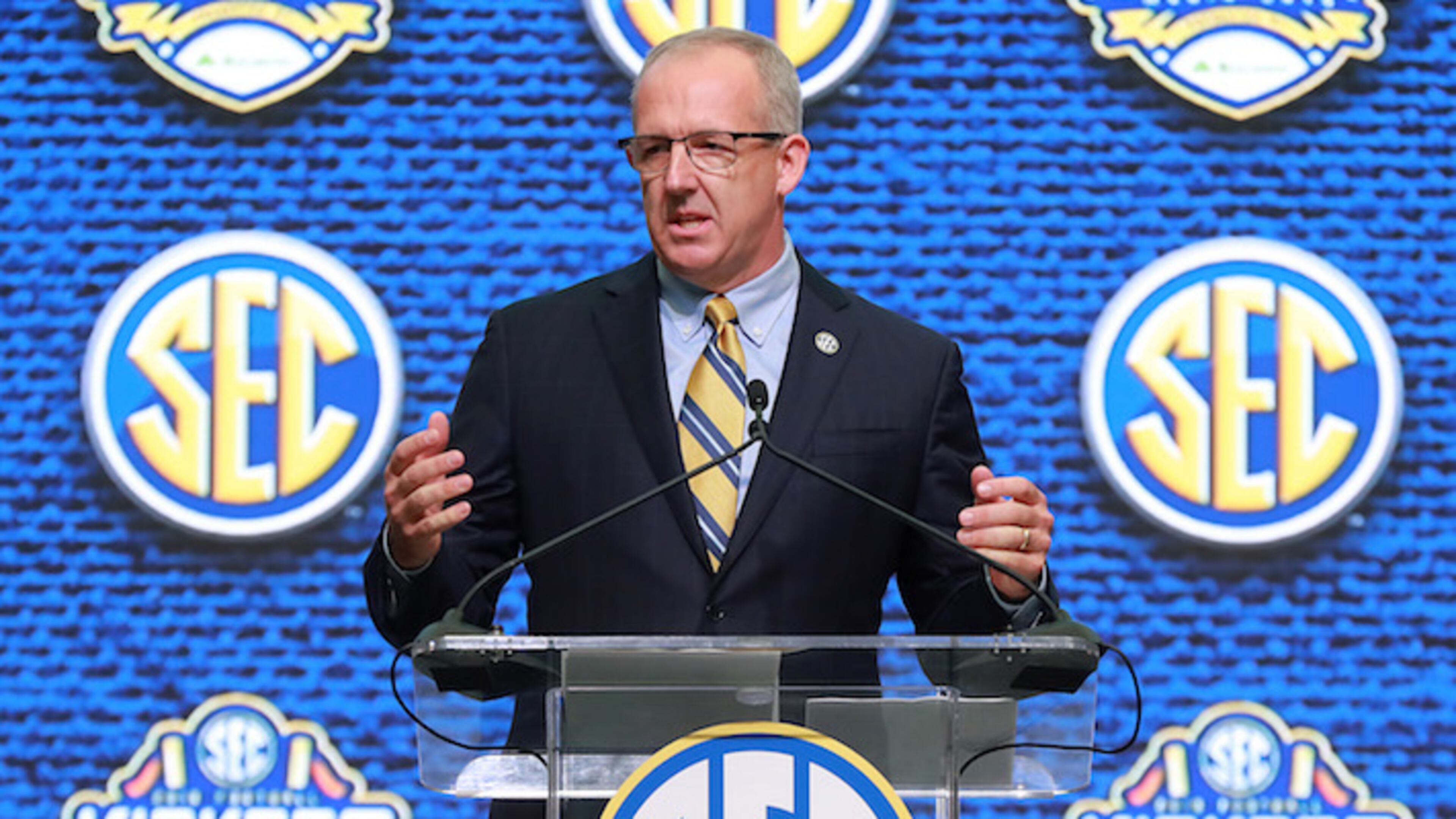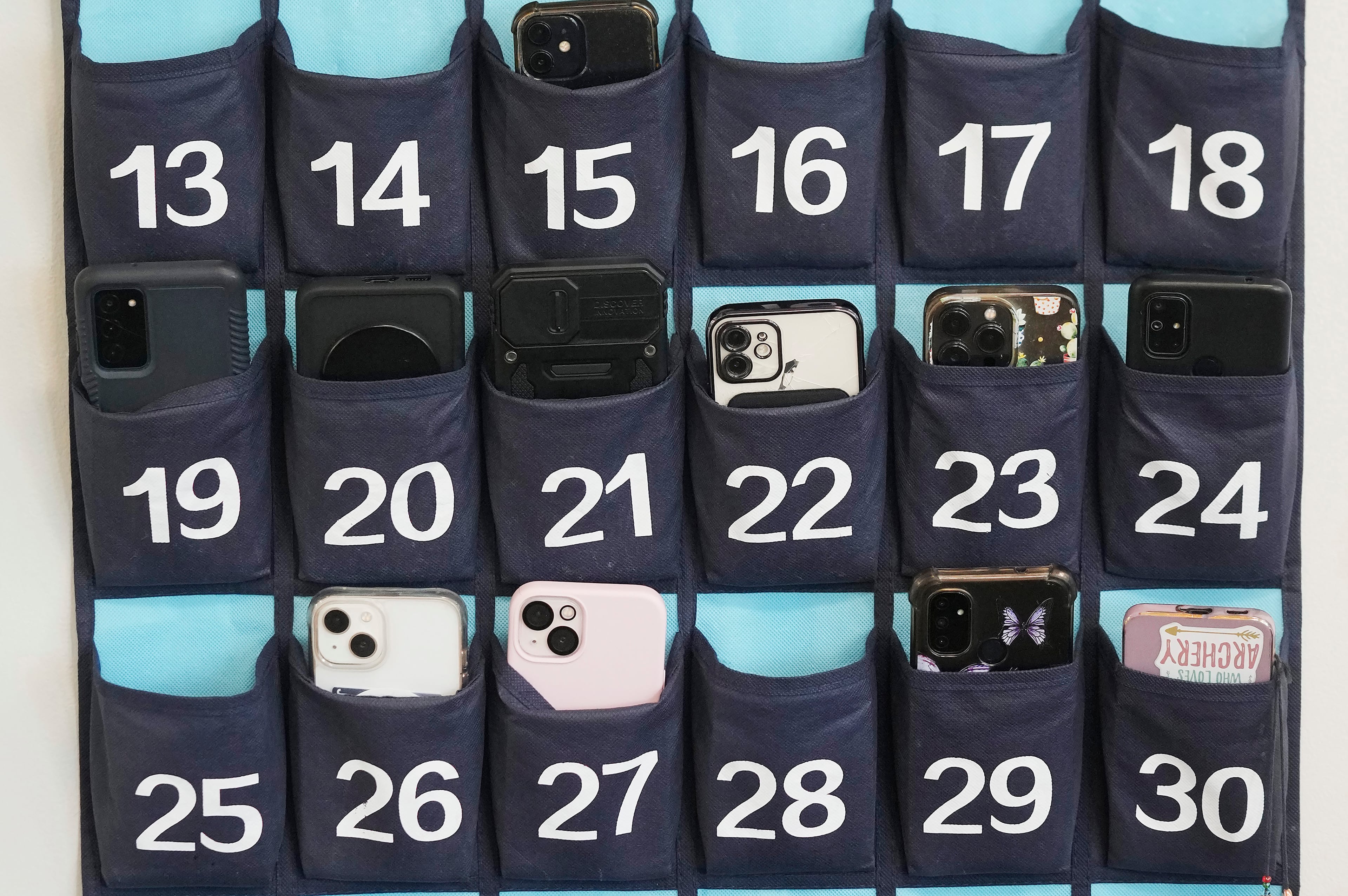SEC Media Days signal football is ‘back toward normal’

Greg Sankey can laugh about it now. We can all laugh about it now. But this time last summer, nobody was laughing.
The SEC’s commissioner was leading an in-person meeting of the league’s athletic directors last July in Birmingham, Ala., to discuss the unrelenting coronavirus pandemic that was threatening to shut down college football and every other fall sport.
“I think we were probably the only conference to gather people in person,” Sankey, the SEC’s commissioner for seven years now, said during an exclusive interview with The Atlanta Journal-Constitution last week. “We had one AD who sneezed close to one of his colleagues in the middle of the meeting. That just about stopped it all right there.”
Fortunately, it didn’t. The SEC pressed on and, as we all know now, the league was able to get in a modified full season of football and eventually saw its conference champion crowned national champion in Alabama.
A year later, things are vastly different. One would almost say they’re back to normal.
SEC Football Media Days, canceled last year when they were scheduled to be hosted in Atlanta, will resume in person this year. The annual preseason talkfest is back in its traditional location of the Wynfrey Hotel in the Birmingham suburb of Hoover, Ala.
But just the fact that there are attendance limitations, social-distancing requirements and participants are encouraged (but not required) to wear masks indicates that everything is not back to normal.
That set-up foreshadows how Sankey and other college athletics leaders are viewing the upcoming football season. Yes, they expect to conduct a full slate of conference and non-conference football games before full-capacity stadiums replete with pregame tailgates, cheerleaders and marching bands. But nobody is guaranteeing anything just yet.
“I have reverted to last summer’s mantra, which is to say we’re going to prepare to play the season as scheduled, but the circumstances around the virus will guide our path forward,” Sankey said. “Unlike last year, I think we’ll be back toward normal, which is different than back to normal. Toward normal, and that means people are preparing to fill stadiums.”
Sankey’s caution is understandable. After the summer and fall he endured last year, he’s not ready to stand up on a mountainside and crow about how they have everything figured out now.
But a year later, most agree that the SEC couldn’t have had a better individual than Sankey navigating the league through one of the most complicated eras in the history of college athletics. Not only is COVID-19 and a few new variants still working its way through our world, there are also some added wrinkles to keep the 56-year-old native of upstate New York and his constituencies hopping. There was the Supreme Court’s decision allowing college athletes can earn money off their name; there is now immediate NCAA eligibility for transfers; new television deals are being negotiated; and everyone anticipates expansion of the College Football Playoff.
“Well, the work cycle has not slowed,” said Sankey, who will deliver an address to open media days on Monday. “I sat here and watched my predecessor (the late Mike Slive) and I knew (previous commissioner) Roy Kramer really well, and one of the things you realize when you sit in this chair is life goes much more intensely and quickly. Starting March, 11, 2020, the pace quickened almost beyond imagination. There was just no stopping it.”
Last March was when COVID-19 first affected college athletics, shutting down the SEC Basketball Tournament after one round in Nashville and every other winter and spring sport thereafter. Scheduled to be hosted at Atlanta’s College Football Hall of Fame, 2020 Media Days were canceled last June. And by the time they were originally scheduled to be held, nobody was sure if there would even be a 2020 football season.
But the SEC got through it. After making the July 30 decision to reduce schedules to 10 games and play only conference contests, the SEC got in all but two of them. Because of the way they decided to set up the schedule and conference championship, they were able to make up several other in-season postponements. Since then, basketball, baseball and all the other sports fielded by SEC teams were able to conduct seasons as well.
It was far from perfect, of course. But a football season that was pronounced dead in mid-August got completed as scheduled. In retrospect, it was an enormous accomplishment. For that, Sankey is given much credit.
At one point, he was the lone voice in athletics administration expressing belief that football still could be played. It was just going to take an abundance of planning, precaution and, above all, patience.
“I think the greatest thing Greg offered was confidence,” said former Georgia Athletic Director Greg McGarity, who worked closely with Sankey through the pandemic and has known him for more than 20 years. “He’s such a brilliant person and he’s able to communicate in such an easy-going manner. The steady hand that he provided with so much information and misinformation flying around will go down in history as a remarkable feat. Thank God he’s our commissioner.”
Sankey said he primarily listened to the science. He oversaw the formation of a medical advisory committee and leaned on them and other health-care officials for advice. As much as any non-doctor in America, he came to understand infectious diseases and how they work.
As a result, Sankey’s mantra became “patience.” So, while other leagues were calling their seasons off, Sankey kept preaching that the SEC needed more time.
Finally, on July 30, the SEC announced that it would be going forward with a conference-only schedule, but that the start — originally set for Labor Day weekend — would be delayed until Sept. 26.
That date was based on scientific data.
“That was three weeks after our students were returning to campus,” Sankey said. “It was also three weeks after Labor Day. We had learned that you had these three-week upticks (in positive cases) after holidays and gatherings. So, we knew we had to weather the return to campus and then we needed to let things settle out.”
Not everybody followed the SEC’s lead. In fact, many leagues didn’t.
On Aug. 9, Sports Illustrated columnist Pat Forde cited sources in reporting that “attempts to salvage the fall 2020 college football season are all but over.” Sure enough, two days later the Big Ten and the Pac-12 suspended their seasons.
Meanwhile, the SEC stood pat. In an Aug. 10 tweet, Sankey wrote: “Can we play? I don’t know. We haven’t stopped trying.”
“There were so many unknowns,” said UGA Athletic Director Josh Brooks, who was overseeing Georgia’s preparations at the time. “Are we going to have a season? When’s it going to start? What’s it going to look like? You didn’t know what you were planning for at the time, so you were planning for all sorts of alternative scenarios.”
They settled on 20% capacity stadiums and three times a week third-party testing of the athletes and team personnel. They also agreed to roster-size and position-specific minimums.
Things rarely went smoothly, but they kept moving. The league played games for the first three weeks without disruption, a validation of Sankey’s early understanding of the virus.
But then the virus made its presence known. One weekend, four of the seven scheduled SEC games were postponed. Georgia was one of two teams to never get a makeup. Its regular-season finale against Vanderbilt never was played. A makeup with Missouri got played on Dec. 12.
If there was any controversy, it was over those roster minimums. Mississippi State played the Bulldogs in Athens on Nov. 21 well below the 53-player minimum and came close to pulling off an upset before falling 31-24. However, other teams opted out though only a single player short and with plenty of walk-ons at their disposal.
“Let’s just say there were a number of conversations about that,” McGarity said. “There were always enough players to play. I think it came down to who really, really wants to play.”
Sankey understood the misgivings but was left to stick to the guidelines as approved by the membership.
“I think the minimums were appropriate,” Sankey said. “In retrospect, would I have set the minimums at 53 for everyone on the roster? That had implications, certainly. But offensive line, defensive line and quarterback were key positions. And with all due respect for what somebody did or didn’t do, I was not comfortable telling a team with three healthy scholarship offensive linemen and nobody else who had played in a college game ‘you have to go play.’ … All things considered, what we did was the best possible judgment at the time.”
It’s a different set of numbers that Sankey is monitoring this year. The biggest development since last fall is the discovery and implementation of a vaccine for COVID-19. That, he said, is what is allowing college football to trend back toward normal.
Sankey said it is the shared goal of the conference and its teams to achieve a 100% vaccination rate among the league’s athletes. They’re not there yet.
“That’s the objective,” Sankey said. “That allows us to continue forward without disruption. All the hard work these young people have done in the offseason and the optimism of looking forward to a normal season, all that can still be disrupted because of COVID. We’re still not done with this virus, but the potential for an outbreak is greatly limited after accessing the vaccine. I can’t make it any clearer than that. That vaccine is the path forward, and that is not a political statement.”
Still, it’s a free world and individuals have the right to decide how they’ll proceed. But the plan right now to play SEC football again and for it to be conducted in the way that we’ve become accustomed. That is, competing before packed stadiums from Labor Day through Thanksgiving with conference and national champions to be crowned thereafter.
Some things will never go back to the way they were before. At Georgia, mobile ticketing and cashless transactions are among the things that are here to stay. But there will also be tailgating and marching bands and, yes, SEC Football Media Days.
“The number one takeaway for me is you don’t take any of this for granted anymore,” Georgia’s Brooks said. “You get really excited about this season, about the return to normalcy, about 92,000 people in Sanford Stadium, about the crowd roaring when the team runs out, that feeling before the fourth quarter when the lights turn red and it gets loud. You don’t take those moments for granted anymore and you can’t wait to make those memories.”
As for Sankey, he’ll have to get excited later. After last summer, he remains both hopeful and cautions.
“You sit here and think about what happened from mid-July to mid-August last year, you better just buckle your seatbelts for this year,” Sankey said. “You just never know. That’s more than a little uncomfortable to have to make that observation, but we still need to be mindful of the realities around us.”
SEC COVID-19 TIMELINE
- MARCH 12, 2020: SEC athletic competition halted
- APRIL 15, 2020: SEC suspends all athletic activity league wide
- MAY 23, 2020: Resumption of voluntary athletic activity approved
- JUNE 8, 2020: SEC football players allowed to return to campus
- JUNE 10, 2020: SEC Football Media Days in Atlanta canceled
- JUNE 14, 2020: COVID-19 management requirements introduced
- JULY 20, 2020: SEC postpones cross country, soccer and volleyball seasons
- JULY 30, 2020: SEC announces in-conference only football and Sept. 26 start date
- AUG. 4, 2020: SEC announces Aug. 17 start to preseason football practice.
- AUG. 7, 2020: SEC medical task force presents report on guidelines and procedures
- AUG. 11, 2020: Big Ten and Pac-12 suspend their football seasons
- AUG. 17, 2020: SEC announces revised 10-game schedules for all teams
- AUG. 18, 2020: SEC announces fan-attendance guidelines
- AUG. 21, 2020: SEC introduces cardiac evaluation policy
- AUG. 27, 2020: SEC announces new start dates for cross country, soccer and volleyball
- AUG. 28, 2020: SEC releases game operation guidelines
- SEPT. 14, 2020: New start dates for swimming, diving and equestrian announced.
- SEPT. 18, 2020: COVID-interruption guidelines introduced
- SEPT 20, 2020: SEC announces contact-tracing procedures
- SEPT 23, 2020: SEC announces third-party testing provider
- SEPT 25, 2020: League announces new start dates for men’s and women’s basketball
- SEPT. 26, 2020: Football season kicks off before reduced-capacity crowds.



